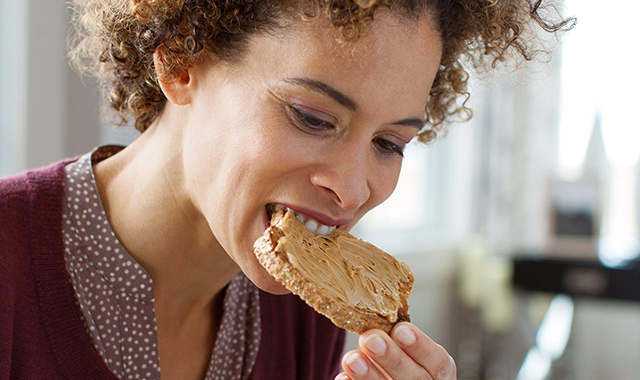Putting the pleasure back into eating with dentures


For many denture wearers, mealtimes and snacks can feel like a trial. But there are some simple ways to make eating something to look forward to again.
From nuts and seeds to fresh or dried fruits, there are numerous foods and drinks that may prove problematic for denture wearers, especially when first getting used to them.
But if you do find yourself wondering ‘how to eat with dentures’ or even ‘can you eat with dentures?’. Here are five top tips for putting the pleasure back into food – whether you’re at home, out for a meal or tucking into snacks while watching the game with friends.
1. Don’t bite off more than you can chew
Re-introducing foods steadily rather than trying to switch back to your pre-denture diet may help your mouth get used to the various challenges different foods now present. It also means you won’t end up putting yourself off your favourite meal or snack forever by unsuccessfully trying it before you’re ready. In other words, don’t bite off more than you can chew!
2. Use a denture adhesive
New Polident Max Seal denture adhesive features a precision nozzle with a finer tip, which leads to a thinner, more precise application and a 36% increase in surface coverage.* This helps form a superior seal** around your whole denture and helps to block out irritating food particles. It also provides a firm 12 hour hold to reduce the risk of your dentures slipping out of place while you eat. This improved retention and stability can also help increase bite force by up to 38%.***
3. Take care of the little things
A common issue you may experience when eating with a partial denture, or a full one, is food particles becoming trapped between your denture and the underlying gum. This may often lead to irritation and discomfort. A denture adhesive may help here by forming a seal between your denture and your gum.
4. Stay positive
Although it may not feel like it at the time, most problems that denture wearers experience with eating tend to be both fixable and far from permanent. Doing your best to focus on what you can eat with dentures, rather than what you can’t will help keep you in a positive frame of mind as you adjust to your new life.
5. Don’t be too hard on yourself
While you may need to avoid trying to return to your normal diet too quickly when first getting used to dentures, or if you experience other common problems like soreness and denture slippage, try not to let all pleasure disappear from food. Some social situations that involve eating, like going to a restaurant, family celebrations or watching a film, can be good opportunities to treat yourself to some of your favourite foods in an enjoyable setting.
Whatever challenges eating with dentures presents for you, rest assured you’re not alone. There are solutions available to help make them as short-lived as possible – from temporarily adjusting your diet to using an effective denture adhesive like new Polident Max Seal that creates a superior seal** and helps to block out irritating food particles. Indeed, by taking the right steps for you, you may soon find that eating becomes one of life’s little pleasures all over again.
*On upper denture when compared with standard Poligrip/ Polident/ Corega in laboratory test
**Based on surface coverage, vs standard Polident in laboratory test
***Compared to no denture adhesive after 1 hour




